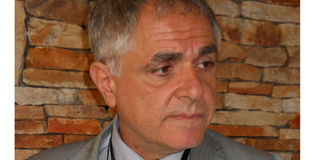European Union diplomat attacks Museveni over graft

Amb Roberto Ridolfi
What you need to know:
Scathing. Envoy pokes holes in President’s State-of-the-Nation Address, saying it ignored key issues of media siege and succession.
Kampala
The European Union yesterday punched holes in President Museveni’s State-of-the-Nation Address delivered last Thursday, but acknowledged his prescriptions for the country’s economic development struck the right chord.
Amb Roberto Ridolfi, the head of the EU Delegation in Uganda, said it is “a pity” that the State-of-the-Nation Address --- a head of state’s most comprehensive accountability to citizens for government’s action and inactions over the previous year --- was not as wide-ranging.
“It is a pity because the state-of-the-nation – [in] my personal view is that – should have covered two or three other items, Mr Ridolfi noted, “I think the people of Uganda were expecting references to this (Gen. David) Sejusa affair, the fight against corruption, which, as I repeat, can display some progress and the closure of the media (houses). These references could have been done positively.”
“I think now that the PAC report is out, you will see another wave. So, let us try to link up the PAC report with the action of the civil society, with the action of the development partners. The most important thing which I tell my colleagues is that we shall not only make happy European taxpayers blocking the disbursement of money to a corrupt set up but we have also demonstrated to the Ugandan tax payers that their work is also to protect their money - by far the largest portion [to the national budget],” said Amb. Ridolfi.
The government last evening down played the significance of the hullaballoo triggered by the vitriolic missives allegedly authored by spy master Sejusa, formerly Tinyefuza, who has raised questions about President Museveni’s supposed succession blue-print.
Sejusa not an issue
“Sejusa is not an issue,” said Col. Shaban Bantariza, the in-coming deputy executive director of Uganda Media Centre, the government’s communication clearing house. Military officers have previously hinted that the general, reported on an extended stay abroad, is being investigated for possible involvement in subversive activities, and some of his aides have already been charged in court.
Col. Bantariza, a former UPDF spokesman, added: “If Sejusa had taken up arms against the government, then it would be a national issue. If Museveni has decided to handle his general in that way [quietly], then let’s wait.”
Gen. Sejusa in an April 29 letter to Internal Security Organisation director-general, Ronnie Balya, called for formal inquiries into allegations that the President wants his son Brig. Muhoozi Kainerugaba, commander of the Special Forces, to succeed him and that some senior military and government leaders hostile to the rumoured plot were on the radar for elimination.
The media’s publication of contents of the missive and follow-up acerbic utterances by the general-cum- army MP, with most of the barbs directed at President Museveni, led to the state’s 11-day shutdown of both the Monitor and Red Pepper publications.
Yesterday, Amb. Ridolfi said in Kampala that the lack of clarity about how Uganda will transition from President Museveni, in power since 1986, has created uncertainty that has prospective European investors nervous. “Business people come here and ask me: Ambassador, what do you think of the succession? Succession! We are [Uganda is] not a monarchy (laughter), he told civil society actors gathered at Speke Resort Munyonyo. “I think you all realise that 27 years in power is very long [period]…”
Mr Museveni would have ruled Uganda for 30 years by 2016 when his current tenure ends – more than the combined years served by his eight predecessors since Independence in 1962 – and he will still be eligible for re-election after the scrapping of the presidential terms limits in 2005, allegedly on his prodding.
Work with parties
The topmost EU diplomat in Kampala said they are working with political parties in the country under the aegis of the National Consultative Forum for electoral reforms instructive to deliver a free and fair ballot, which he said is the safety guard for the post-Museveni epoch.
“Succession of power is [through] free and fair election and free and fair election is not yet [achieved in Uganda]. Why? Because we need to build the confidence of an Electoral Commission that represents the views of everybody and is independent,” he said.
The Supreme Court in Dr Kizza Besigye’s 2001 and 2006 presidential election petitions ruled that the Eng. Badru Kiggundu-led EC did not comply with some of the electoral laws and guidelines, and made recommendations for electoral improvements.
And opposition parties prior to the February 2011 general elections unsuccessfully nudged for disbandment of the present electoral body and its replacement with a more representative one selected not by the President but a neutral state organ.
There is reported to be some progress in the on-going behind-the-scenes political and diplomatic bargain for electoral reforms, three years ahead of the next scheduled General Election.
Amb. Ridolfi, who was yesterday launching a new Coalition of six human rights bodies, said only a truly democratic dispensation can safeguard Uganda’s economic progress and deliver benefits for all citizens.
He said: “You can have economic growth but to sustain it and deliver to every citizen, you need respect of rule of law, very strong institutions and good democratic process.”
Col. Bantariza had said individuals not satisfied with President Museveni’s state-of-the-nation message should look up to him for answers tomorrow when he speaks again after Finance Minister Maria Kiwanuka reads the 2013/14 budget.



